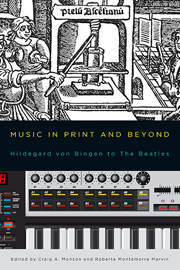Book contents
- Frontmatter
- Dedication
- Contents
- Acknowledgments
- Introduction
- 1 Robert Granjon and Music during the Golden Age of Typography
- 2 Publishing Music Theory in Early Cinquecento Venice and Bologna: Friends and Foes
- 3 Preaching to the Choir: Arts of Persuasion in the Converts of Italy
- 4 Music Distribution in London during Handel's Lifetime: Manuscript Copies versus Prints
- 5 Beethoven's Miniatures
- 6 “The Beautiful and the Ugly”: Travel Literature, Racial Theory, and a Schumann Song
- 7 Verdi's “Music of the Future”
- 8 The Suspended Voice of Amália Rodrigues
- 9 More than Mostly Mozart: Teddy Wilson's “China Boy”
- 10 Wanted Dead and Alive: Historical Performance Practice and Electro-Acoustic Music from IRCAM to Abbey Road
- 11 Lowinsky's Secrets
- 12 The Unknown Hildegard: Editing, Performance, and Reception (An Ordo Virtutum in Five Acts)
- List of Contributors
- Index
8 - The Suspended Voice of Amália Rodrigues
Published online by Cambridge University Press: 05 March 2014
- Frontmatter
- Dedication
- Contents
- Acknowledgments
- Introduction
- 1 Robert Granjon and Music during the Golden Age of Typography
- 2 Publishing Music Theory in Early Cinquecento Venice and Bologna: Friends and Foes
- 3 Preaching to the Choir: Arts of Persuasion in the Converts of Italy
- 4 Music Distribution in London during Handel's Lifetime: Manuscript Copies versus Prints
- 5 Beethoven's Miniatures
- 6 “The Beautiful and the Ugly”: Travel Literature, Racial Theory, and a Schumann Song
- 7 Verdi's “Music of the Future”
- 8 The Suspended Voice of Amália Rodrigues
- 9 More than Mostly Mozart: Teddy Wilson's “China Boy”
- 10 Wanted Dead and Alive: Historical Performance Practice and Electro-Acoustic Music from IRCAM to Abbey Road
- 11 Lowinsky's Secrets
- 12 The Unknown Hildegard: Editing, Performance, and Reception (An Ordo Virtutum in Five Acts)
- List of Contributors
- Index
Summary
The search for authenticity, nearly everywhere we find it in modern times, is bound up with a radical rejection of things as they are.
—Marshall Berman, The Politics of AuthenticityFor Portuguese music as for Portuguese politics, 1926 marked a historical watershed. The military coup of May 28, 1926, led by General Manuel Gomes da Costa, put an end to the First Republic and ushered in a conservative dictatorship that by 1933 had mutated into a full-fledged authoritarian regime, the self-proclaimed Estado Novo. The year of the coup also saw the introduction of electrically reproduced sound in Portugal, when Columbia Graphophone Company and the Gramophone Company partnered with the local music dealers Valentim de Carvalho and Bazar do Porto in Lisbon and Oporto, respectively. Thus, Portuguese cultural modernity was double-layered from its inception, pairing up conservative political aspirations with the installation of sound in electric circuitry. It is now de rigueur to claim a determinant role for new media technology in the cultural fashioning of the Estado Novo. But the terms of the relationship between the political and the technological remain undertheorized, routinely cast as one of mastermind and executor. In this regard, today's historiographic consensus pays lip-service to the old regime's stated policy, that which the first director of the national radio, Captain Henrique Galvão, voiced in 1935 with expected military redundancy: “The national broadcast, an effort of the Estado Novo, is today like one more volunteering soldier, a new force in the service of the Estado Novo.”
- Type
- Chapter
- Information
- Music in Print and BeyondHildegard von Bingen to The Beatles, pp. 180 - 199Publisher: Boydell & BrewerPrint publication year: 2013

